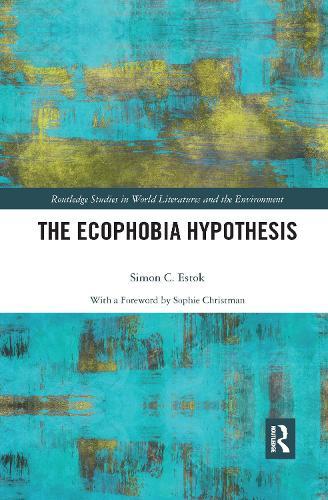Full Product Details
Author: Simon Estok (Sungkyunkwan University, South Korea) ,
Sophie Christman
Publisher: Taylor & Francis Ltd
Imprint: Routledge
Weight: 0.308kg
ISBN: 9780367616649
ISBN 10: 0367616645
Pages: 198
Publication Date: 18 December 2020
Audience:
College/higher education
,
Tertiary & Higher Education
,
Undergraduate
Format: Paperback
Publisher's Status: Active
Availability: In Print

This item will be ordered in for you from one of our suppliers. Upon receipt, we will promptly dispatch it out to you. For in store availability, please contact us.
Reviews
Well researched, vigorously argued, and capaciously framed, The Ecophobia Hypothesis culminates years of careful work by Simon Estok on the intimacy of contemporary environmental catastrophe to an enduring human fear of the natural world-a horror that needs to be thought alongside the much documented love of life which occupies much environmental writing. This book will deeply unsettle its readers. Yet it also offers wider historical, psychological, and material understandings of how we arrived at our state of unremitting crisis ... and why disruption of our comfortable eco-epistemological frameworks is so necessary now. -Jeffrey J. Cohen, Co-President, Association for the Study of Literature and Environment (ASLE), Dean of Humanities, Arizona State University, USA At the conclusion of his much anticipated, deeply learned, and clearly written study Simon Estok writes that Understanding how ecophobia prompts environmental injustice (and environmental racism) produces a more comprehensive and wider understanding of the mutually reinforcing ethics that bring about oppression and suffering-social and environmental. Understanding this is what the ecophobia hypothesis seeks. Beginning with exposing the human fear of nature, Estok considers a fresh methodological model in the examination of our complicity in climate change, the most pressing concern of our times. The Ecophobia Hypothesis is essential reading for all students of interdisciplinary literary studies, critical theory and concepts, feminist literature and theory, and of course environmental studies. -William Baker, Distinguished Professor Emeritus, Northern Illinois University Simon Estok has written his long-awaited, masterful, invigorating, exhaustive, and unequivocally convincing thesis that confronts and corrects the notion of biophilia. Estok is at his very best here. Sure-footed on the slopes of theory, graceful on wing in the skies of controversy, and unrelenting in the arts of persuasion, Estok dazzles with his wide-ranging discussions about ecophobia-discussions that range from the dangerous shoals of genetic materialism to the more calm waters of ecomedia, animal studies, and evolutionary psychology. From its startling insights about hollow ecology and junk agency to its unapologetic stance arguing the necessity of acknowledging the dark, antagonistic, and exploitative responses and reflexive fears that characterize so much of the collective human response to nature, The Ecophobia Hypothesis is a must-read for anyone in the environmental humanities. -Dr. Jonggab Kim, Director of the Body Studies Institute, Konkuk University, Seoul. Human interactions with the nonhuman world exhibit affinity, antagonism, and a vast array of complicated emotions between the two extremes. The psychology of human attitudes and actions toward nature is fascinating and difficult to explain. Relying on the evidence he finds in a wide range of cultural texts, Simon Estok explores the dark and fearful part of the emotional spectrum in this provocative study of ecophobia. This may help to explain why our civilization treats the planet so callously. -Paul Slovic, Professor of Psychology, University of Oregon The irrational fear of the things and beings of the natural world finds its best conceptualization in Simon Estok's The Ecophobia Hypothesis. Estok's riveting conjectures on ecophobia are not only theoretically cogent but also provide affective and cognitive insights into the darkness of human reflexes that induce what he calls hollow ecology. Estok entangles the reader in the ecopsychological and ecocultural swings of the ecophobia condition through the intersecting mirrors of genetic materialism, animal studies, ecomedia, and ecopsychology. This book will open many eyes to the disquieting reality of humanity's ecological unconscious and liberate the reader from the existential trouble that this unconscious represents. -Serpil Oppermann, President, the European Association for the Study of Literature, Culture, and the Environment of (EASLCE). This bracing and wide-ranging book demonstrates the importance of Estok's concept of ecophobia not only for ecocriticism and ecomedia studies, but for combating the proliferation of waste, the systemic violence toward nonhuman creatures, and the degradation of planetary life. - Stacy Alaimo, Co-President of ASLE (Association for the Study of Literature and Environment ).
Author Information
Dr. Simon C. Estok is a Senior Fellow and Full Professor at South Korea’s oldest university, Sungkyunkwan University (established in 1398), where he teaches literary theory, ecocriticism, and Shakespearean literature. Estok is also a recipient of the Shanghai Metropolitan Government ""Oriental Scholar"" Award (东方学者) (2015-2018) at the Research Center for Comparative Literature and World Literatures at Shanghai Normal University. His award-winning book Ecocriticism and Shakespeare: Reading Ecophobia appeared in 2011 (reprinted 2014), and he is co-editor of a book entitled Landscape, Seascape, and the Eco-Spatial Imagination (Routledge, 2016). Estok also co-edited International Perspectives in Feminist Ecocriticism (Routledge, 2013) and East Asian Ecocriticisms (Macmillan, 2013) and has published extensively on ecocriticism and Shakespeare in such journals as PMLA, Mosaic, Configurations,English Studies in Canada, Concentric, Neohelicon, and others. Dr. Estok received his MA and PhD in English Literature from the University of Alberta.




